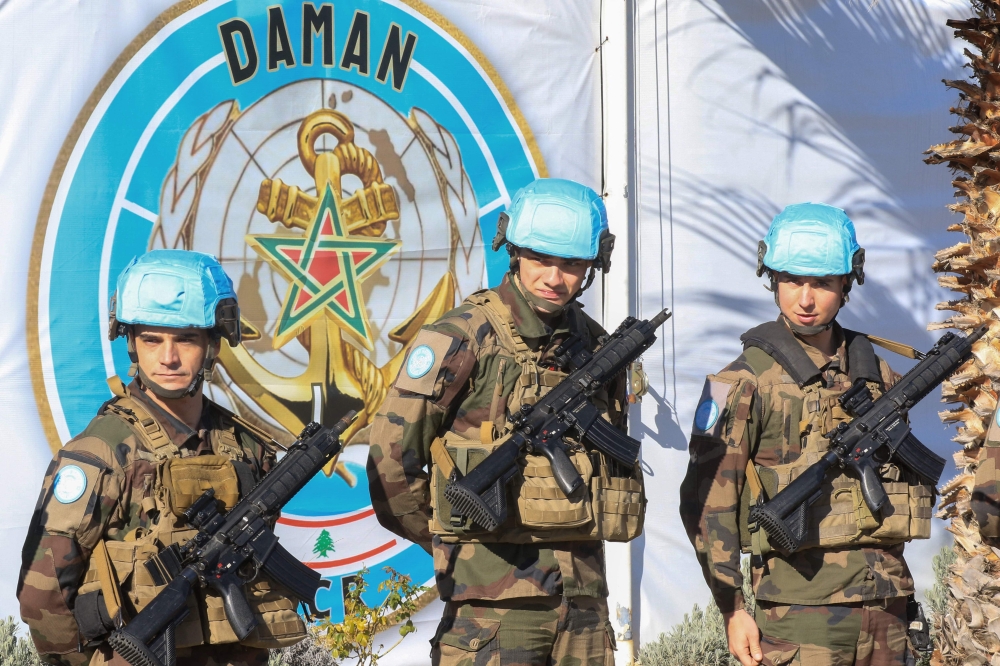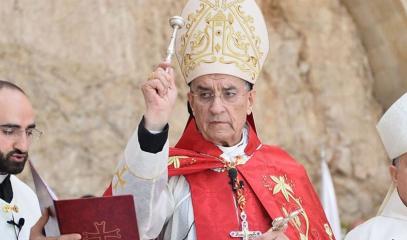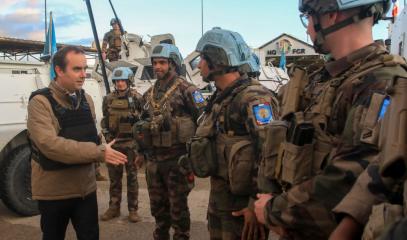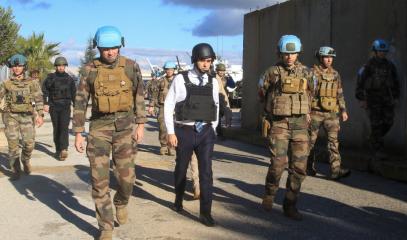Lebanon's 2025 challenges : Presidential elections and the withdrawal of Israeli forces
A climate of relative stability in preparation for the Lebanese Parliament's election of a new head of state on 9 January. A framework that remains fragile, given Hezbollah's determination to reorganise its forces, Iranian influence and the IDF troops still present. Elements that undermine institutions, border security and economic recovery.
Beirut (AsiaNews) - It is against a backdrop of relative stability that the Lebanese parliament is set to meet on 9 January to elect a new president of the republic after a two-year, two-month vacancy.
The turning point came after the truce between Israel and Hezbollah came into effect on 27 November, after two months of open warfare. However, there is still no certainty that the parliamentary session will be successful, although House Speaker Nabih Berry has invited the diplomatic corps to attend; among those present are the US envoy Amos Hochstein, architect of the truce, and the counterpart of French President Emmanuel Macron, Jean-Yves Le Drian.
The candidate most likely to be elected is the current army commander, General Joseph Aoun. Others include banker Samir Assaf, ‘parachuted in’ by the French head of state, MPs Farid Boustany and Neemat Frem, and former Interior Minister Ziyad Baroud.
Gen. Aoun has just paid a visit to Saudi Arabia; the timing of the visit suggests that he has the support of the Wahhabi kingdom, which should increase his chances of being elected, although it does not guarantee absolute certainty.
Hezbollah, and the Amal movement, gave up trying to impose the candidacy of leader Sleiman Frangié after the collapse of Syrian President Bashar al-Assad's regime, whose former MP considered himself a ‘friend’ and ally.
However, it remains possible that Frangié will transfer his votes to another candidate. The election must be won with a majority of 85 preferences in the first round and an absolute majority of 65 in the second, in a chamber of 128 MPs.
At the moment, there is no candidate who seems to be able to obtain the necessary numbers, either in the first or second round.
At the same time, one of the stumbling blocks in previous votes was the lack of a quorum in the first round, preventing the election of a president with only 65 votes.
This time, the Speaker of the House has assured that the 27-member Shiite bloc will not withdraw from the chamber and is ready to participate in subsequent ballots until a new head of state is elected, giving deputies breaks to consult between rounds.
As the date of the vote approaches, the rift between the various components of the Assembly is getting tougher.
Hezbollah, still strong internally, wants to impose a ‘consensus’ candidate who will allow it to continue to enjoy military autonomy. On the opposite front, the aim is to impose a strong new president who will force the pro-Iranian Shiite movement to fully comply with UN Resolution 1701, which provides for its disarmament ‘from north of the Litani river’, and not only south of this line.
Thus, the future of Lebanon is at stake, after the catastrophic war in which Hezbollah dragged the Cedar Country, costing 21 thousand dead and wounded, 10 billion dollars in damage, and the destruction of 200 thousand housing units.
Without officially reacting, this camp took into account an opinion by Massad Boulos, the Middle East political advisor to US President-elect Donald Trump; he would in fact have asked for the date of the vote to be postponed until after the new occupant of the White House takes office on 20 January next. For his part, the head of the Maronite Church Patriarch Beshara Raï insists that the elections be held on the scheduled date.
Israel in the south
The country also suffers from the fact that some thirty villages in the south of Lebanon are still off-limits to the population while waiting, in principle, for the expiry of the 60-day period granted to Israel to completely evacuate the territory. And for Hezbollah to hand over all its positions to the Lebanese army and the Unifil mission.
This deadline runs from the ceasefire of 27 November, but it is clear that Israel is ignoring it by procrastinating indefinitely on the withdrawal operations agreed upon at the time of the truce.
At the same time, the Jewish state has not yet asked the population in the northern regions to return to their homes and has unofficially indicated that it might postpone the withdrawal from Lebanon until next March.
In reality, the Israeli military (IDF) has no qualms about carrying out raids outside the conquered perimeter, blowing up buildings, tunnels, and weapons caches; there is also no shortage of deadly drone attacks in depth, to complete what the war had not allowed them to do and eliminate the fighters of the Party of God.
Moreover, some strategic high ground remains under the control of the IDF. For military experts, these violations are inevitable until the Lebanese army dismantles Hezbollah's military infrastructure and deploys throughout the area south of the Litani River.
This dismantling depends on the goodwill of the Shiite movement and the very strengthening of the national army, which, however, cannot empty other open fronts; these include the borders with the new Syria, where it is necessary to prevent the infiltration of elements of the former Syrian regime seeking refuge in Lebanon, as well as the delicate internal fronts where discord may arise.
As for increasing the army's strength, all that is known is that, starting in 2025, it will have to take in 6,000 new soldiers, in three groups of 2,000 each, taking into account that each group requires three months of training.
Hostage to Israeli threats to strike ‘the whole of Lebanon and not just Hezbollah’ if the ceasefire is violated, the pro-Iranian party protests verbally, but does not dare react militarily to these blatant violations.
In absolute terms, and the Israelis know this, the time it takes to increase the strength of the army will allow Hezbollah to reconstitute itself militarily, even though the fall of the regime in Syria has cut it off from its land supply sources.
According to military expert Khalil Hélou, questioned by AsiaNews, ‘sea routes [through the Suez Canal] remain an option for arms and Iranian diplomatic pouches for funding’.
The secretary general of the party, Naïm Kassem, continues to speak as if he has triumphed over Israel, and Tehran does not fail to applaud.
Finally, on 31 December, French Armed Forces Minister Sébastien Lecornu, on a visit to the Unifil base in Deir Kifa in the south, stressed the need to preserve the ‘fragile’ ceasefire in force since 27 November and now halfway through its period of validity.










.png)










